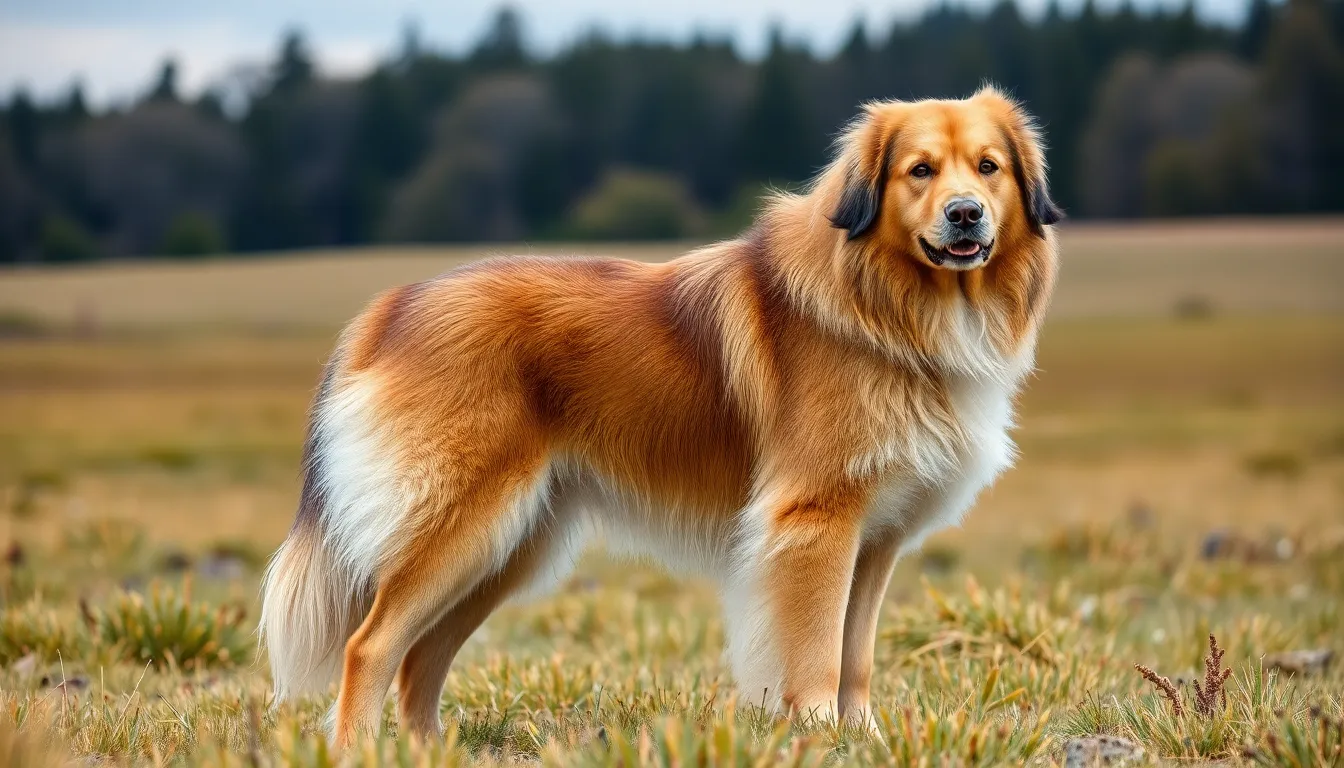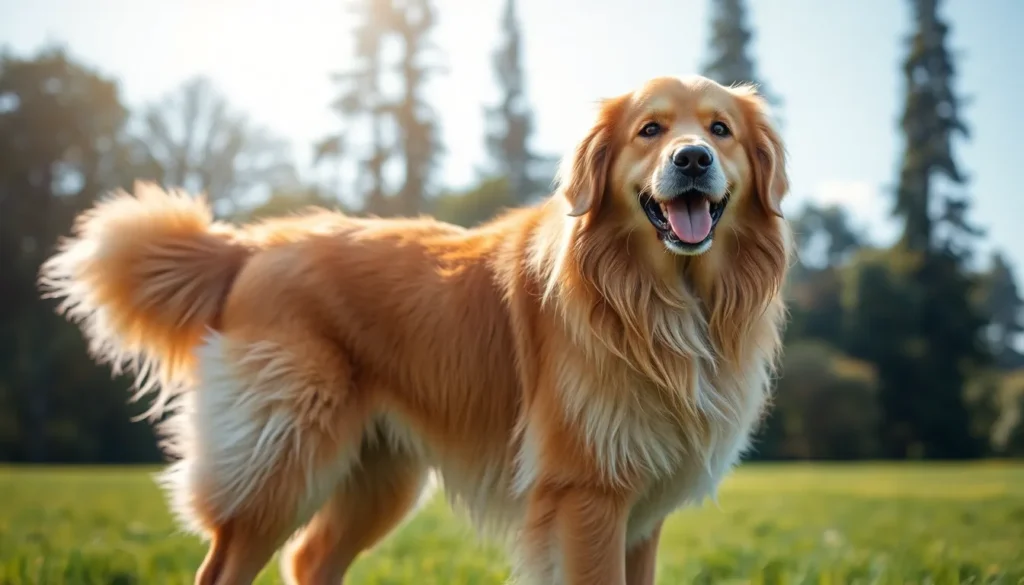Table of Contents
ToggleThe full-grown Golden Mountain Dog is a stunning blend of three beloved breeds: the Golden Retriever, Bernese Mountain Dog, and the Poodle. This hybrid dog brings together the best traits of its parent breeds, resulting in a friendly and intelligent companion. With their striking appearance and gentle temperament, these dogs have quickly gained popularity among families and dog lovers alike.
As they mature, Golden Mountain Dogs showcase a remarkable balance of energy and calmness. They thrive in active households but also enjoy snuggling up on the couch after a long day. Understanding their needs and characteristics is essential for anyone considering adding one of these delightful dogs to their family. From grooming to training, knowing what to expect can make all the difference in ensuring a happy and healthy life together.
Overview of Full Grown Golden Mountain Dog
Full grown Golden Mountain Dogs typically weigh between 70 to 95 pounds and stand 20 to 26 inches tall at the shoulder. Their distinctive appearance features a thick, wavy coat that often combines the coloring of their parent breeds, usually exhibiting shades of gold, black, and white.
Golden Mountain Dogs possess a friendly disposition, making them excellent family pets. Their sociable nature leads to strong bonds with children and other animals, promoting a harmonious household environment. These dogs display high intelligence, which aids in training and obedience. Regular mental stimulation, through activities or interactive toys, enhances their cognitive engagement.
The energy level in adult Golden Mountain Dogs remains moderate to high. They thrive in active settings, benefiting from daily exercise such as walks, runs, or play sessions. Incorporating a variety of physical activities helps maintain their health and prevents boredom.
Grooming is essential for this breed due to their dense fur. Regular brushing, at least two to three times a week, prevents matting and manages shedding. Bathing should occur as needed to keep the coat clean and fresh. Regular eye, ear, and dental care contribute to overall wellness.
Socialization plays a critical role during their early development. Introducing Golden Mountain Dogs to different environments, people, and other pets fosters calm behavior and adaptability. With proper training and social exposure, they develop into well-rounded companions.
Health considerations include monitoring for common issues found in larger breeds, such as hip and elbow dysplasia and certain heart conditions. Periodic veterinary check-ups help ensure they maintain good health. By understanding their needs and characteristics, owners cultivate a loving and gratifying relationship with their Golden Mountain Dog.
Appearance and Characteristics

The full-grown Golden Mountain Dog presents a unique and appealing look. These dogs exhibit a combination of features from their parent breeds, resulting in a striking and friendly appearance.
Size and Weight
Full-grown Golden Mountain Dogs stand 20 to 26 inches tall at the shoulder. Their weight typically ranges from 70 to 95 pounds. Males often fall at the higher end of this spectrum, while females tend to be slightly smaller. This size makes them suitable for homes with ample space for movement and play.
Coat and Color
Golden Mountain Dogs possess a thick, wavy coat that enhances their beauty. The coat commonly displays a mix of gold, black, and white colors, reflecting genetic influences from the Golden Retriever, Bernese Mountain Dog, and Poodle. The fur is dense, providing insulation and protection against various weather conditions. Regular grooming is essential to maintain coat health, minimize shedding, and prevent matting, ideally performed with weekly brushing and occasional baths.
Temperament and Behavior
The Golden Mountain Dog’s temperament reflects its friendly and gentle nature, making it well-suited for family environments. This breed excels in social interactions and requires consistent training to ensure a well-mannered companion.
Social Interaction
Golden Mountain Dogs exhibit a naturally sociable demeanor. They thrive in the company of people and other animals, showcasing affection towards children and adults alike. Their playful disposition encourages positive interactions during playtime, leading to strong bonds with family members. Early socialization plays a critical role in their development, helping them become well-adjusted adults. Exposing them to various environments, sounds, and experiences promotes confidence and reduces potential behavioral issues.
Training and Obedience
Training a Golden Mountain Dog involves consistency and positive reinforcement techniques. This breed responds well to rewards-based training, which includes treats, praise, and playtime. Basic commands like sit, stay, and come should be introduced early. Regular training sessions foster obedience and mental stimulation, essential for this intelligent breed. Challenges encountered during training can often be mitigated with patience and persistence, ensuring a well-behaved companion capable of understanding household rules and expectations.
Health and Care Requirements
The full-grown Golden Mountain Dog requires attention to health and grooming to thrive. By addressing common health issues and grooming needs, owners can ensure their dog’s well-being.
Common Health Issues
Golden Mountain Dogs are prone to several health concerns, primarily due to their size. Common issues include:
- Hip Dysplasia: This genetic condition affects the hip joint, leading to arthritis and pain. Regular vet check-ups help in early detection.
- Elbow Dysplasia: Similar to hip dysplasia, this condition impacts the elbow joint and can cause discomfort. Healthy weight management can mitigate risks.
- Bloat: Large breeds are at risk for bloat, a severe condition involving stomach twisting. Feeding smaller, frequent meals may reduce the occurrence.
- Skin Allergies: Prone to allergies due to their dense coats, Golden Mountain Dogs may require hypoallergenic products. Observing any changes in skin or coat health is essential.
- Heart Conditions: Conditions such as dilated cardiomyopathy may arise, necessitating regular veterinary screenings to monitor heart health.
Awareness of these health issues allows for proactive measures in care and management.
Grooming Needs
Grooming is crucial for maintaining the health and appearance of a Golden Mountain Dog’s coat. Key grooming requirements include:
- Brushing: At least once a week, owners should brush the dog’s thick, wavy coat to prevent matting and reduce shedding.
- Bathing: Occasional baths, approximately every 2 to 3 months, help keep the coat clean and healthy.
- Nail Trimming: Regular trimming, typically every 4 to 6 weeks, prevents overgrown nails that may cause discomfort.
- Ear Cleaning: Owners should check the dog’s ears weekly for wax buildup and dirt to prevent infections.
- Dental Care: Brushing teeth two to three times a week supports good oral hygiene and prevents dental diseases.
Following these grooming needs promotes not only the dog’s physical health but also facilitates bonding between pet and owner.
Benefits of Owning a Full Grown Golden Mountain Dog
Owning a full-grown Golden Mountain Dog provides numerous advantages that enhance the experience of pet companionship.
- Companionship: Golden Mountain Dogs thrive on social interaction and form strong bonds with family members, offering consistent loyalty and affection. Their friendly disposition contributes to a warm home atmosphere, especially with children and other pets.
- Intelligence: This breed combines the intelligence of the Golden Retriever and Poodle, making them quick learners. Their ability to grasp new commands and tricks efficiently ensures an enriching training experience.
- Moderate Energy: These dogs enjoy active play but also value relaxation. Their balanced energy levels enable them to adapt to different lifestyles, whether it involves daily walks or quiet evenings at home.
- Gentle Temperament: Golden Mountain Dogs exhibit a gentle nature, making them excellent therapy and emotional support animals. Their calm demeanor can ease stress and anxiety, providing comfort to owners and family members.
- Versatile Activities: Owners can engage in various activities, including hiking, swimming, and agility training, given the dog’s diverse energy range. This versatility enhances the bond between the owner and the dog.
- Health Benefits: Caring for a Golden Mountain Dog encourages an active lifestyle for owners. Regular exercise, grooming, and playtime contribute to overall physical and mental well-being for both the dog and its human companions.
- Adaptability: Golden Mountain Dogs adjust well to different living environments, whether in a spacious home or a smaller apartment. They require sufficient mental and physical stimulation to thrive, fitting seamlessly into varied lifestyles.
These benefits demonstrate how owning a full-grown Golden Mountain Dog can lead to a fulfilling and harmonious relationship between the dog and its owner.
The full-grown Golden Mountain Dog stands out as an exceptional family companion. With their friendly demeanor and gentle nature they easily become beloved members of any household. Their adaptability to various lifestyles makes them perfect for both active families and those who enjoy quieter moments.
Regular grooming and consistent training are key to ensuring their well-being and happiness. By meeting their needs for exercise and mental stimulation owners can enjoy a rewarding relationship with these intelligent dogs. With proper care they not only thrive but also provide unwavering loyalty and affection. Embracing the joys of life with a Golden Mountain Dog can lead to countless cherished memories.







